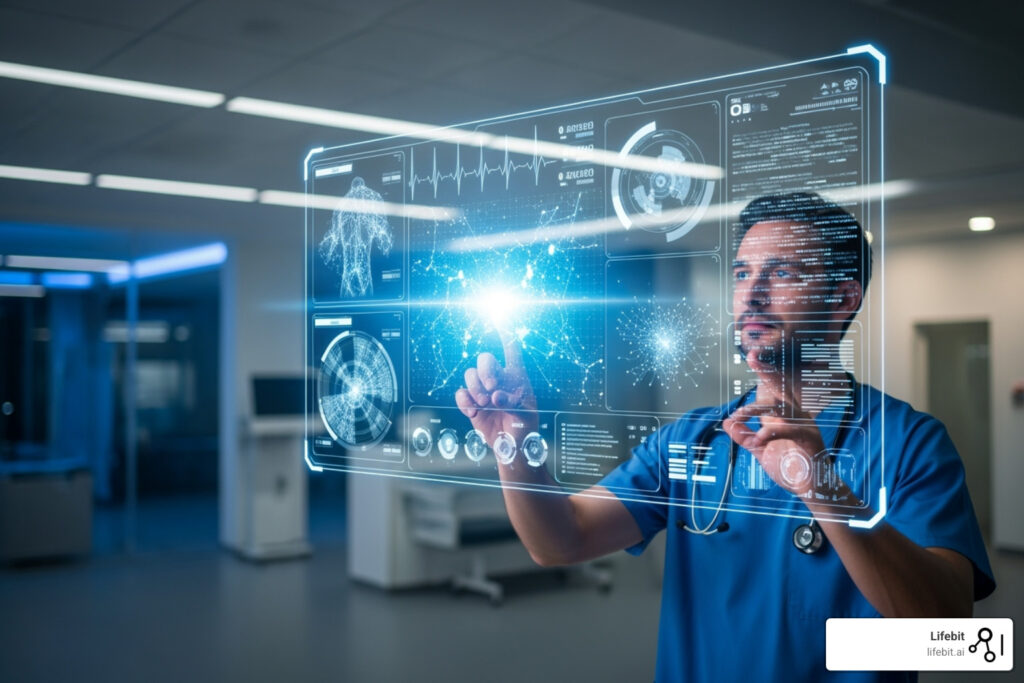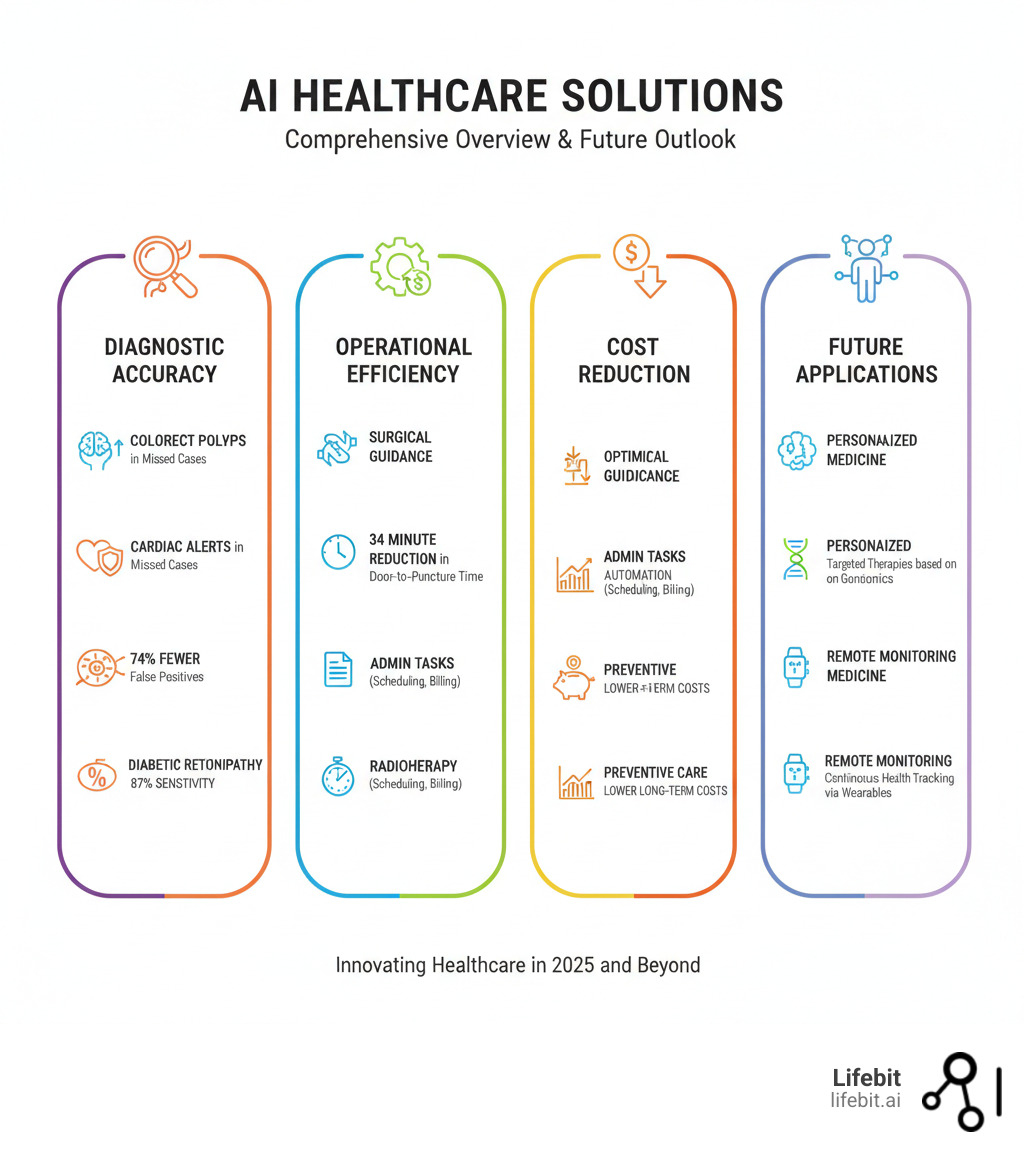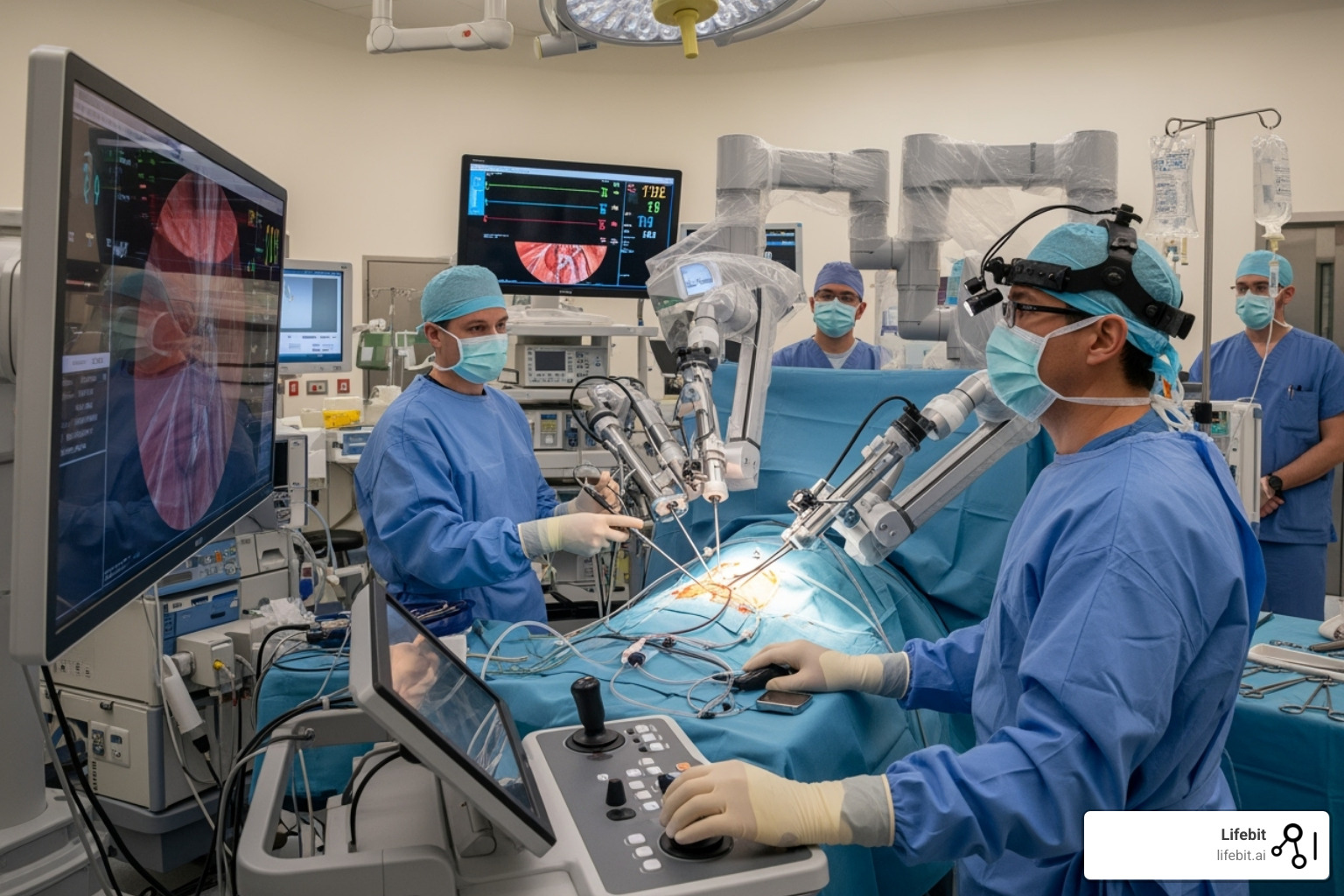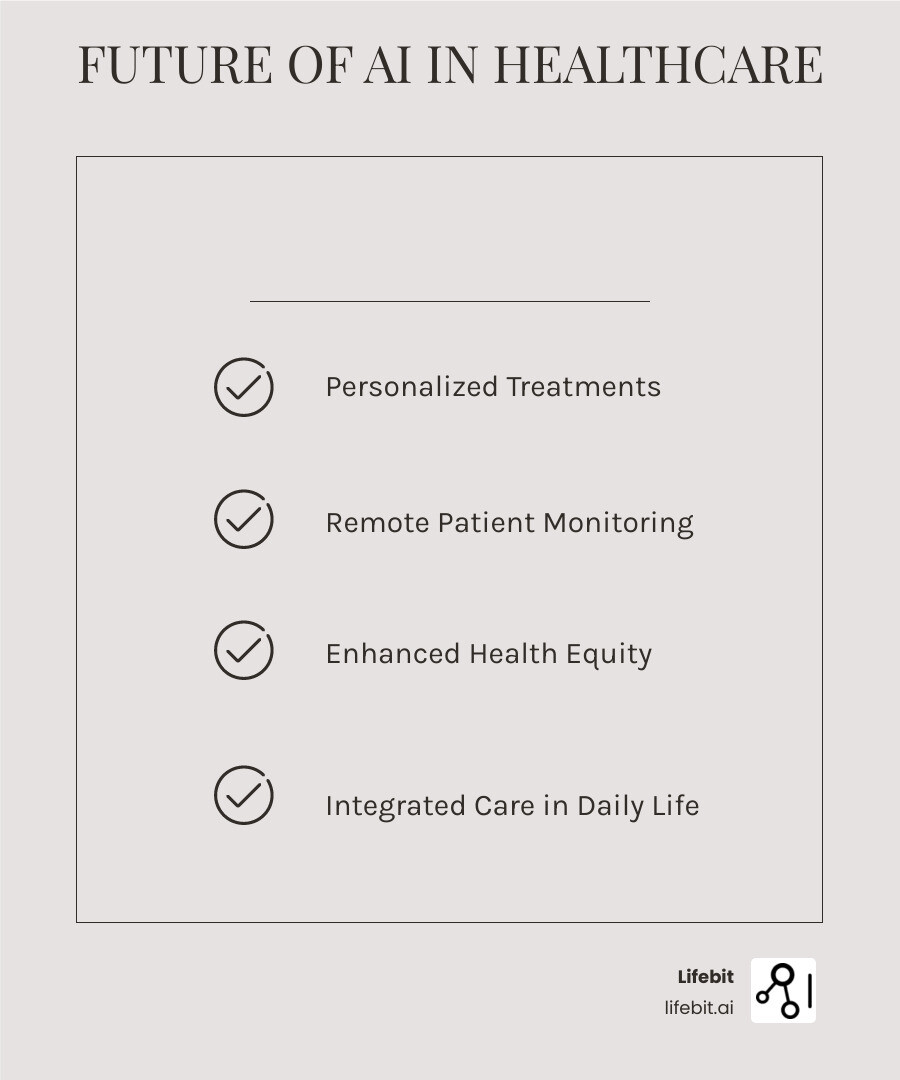Revolutionizing Care: Top AI Solutions for Modern Healthcare

AI healthcare solutions: Top Revolutionary Care
Why AI Healthcare Solutions Are Changing Modern Medicine
AI healthcare solutions are revolutionizing how we diagnose diseases, treat patients, and manage healthcare operations. These powerful technologies combine machine learning, data analytics, and automation to deliver better patient outcomes while reducing costs and improving efficiency across healthcare systems worldwide.
Key AI healthcare solutions changing medicine today:
- Diagnostic AI: Reduces missed colorectal polyps by 50% and cuts false cardiac alerts by 74%
- Surgical AI: Provides real-time guidance and reduces door-to-puncture time by 34 minutes for stroke patients
- Administrative AI: Automates scheduling, documentation, and billing processes
- Drug Findy AI: Accelerates compound screening and clinical trial optimization
- Predictive AI: Enables early disease detection and proactive patient care
- Remote Monitoring AI: Powers wearable devices for continuous health tracking
The impact is measurable. AI algorithms now achieve 87% sensitivity in detecting diabetic retinopathy, while AI-powered surgical planning reduces radiotherapy preparation time by up to 90%. For healthcare leaders managing complex, siloed datasets, these solutions offer the scalability and compliance needed to open up real-time insights from EHR, claims, and genomics data.
Healthcare faces unprecedented challenges: 4.5 billion people lack access to essential services, and we’ll face an 18 million healthcare worker shortage by 2030. AI offers a path forward, enabling healthcare systems to achieve better outcomes with existing resources while expanding access to quality care globally.
I’m Maria Chatzou Dunford, CEO and Co-founder of Lifebit, where I’ve spent over 15 years developing AI healthcare solutions that transform global healthcare through federated data analysis and precision medicine platforms. My work focuses on making AI accessible and trustworthy for pharmaceutical organizations and public health institutions navigating complex biomedical data challenges.

The Core Benefits of Integrating AI into Healthcare Systems
Healthcare is experiencing a profound change, and AI healthcare solutions are at the heart of this change. When we integrate AI into healthcare systems, we’re not just adding new technology – we’re fundamentally reshaping how care is delivered, making it more precise, efficient, and accessible for everyone.
The most exciting benefit is how AI dramatically improves patient outcomes. These systems analyze vast amounts of data to help doctors make better decisions faster. This means more accurate diagnoses, personalized treatments, and fewer medical errors. Patients get the right care at the right time, which can be life-changing.
Operational efficiency gets a major boost too. AI takes over repetitive tasks like scheduling and data entry, freeing up healthcare professionals to focus on what they do best – caring for patients. This automation also helps reduce the burnout that many clinicians face from administrative overload.
Perhaps most importantly, AI helps with cost optimization without compromising quality. By reducing unnecessary tests, streamlining workflows, and catching problems early through predictive analytics, healthcare systems can deliver better care while spending less money. It’s a win-win situation that makes healthcare more sustainable for everyone.
Enhancing Diagnostic Accuracy and Patient Outcomes
The diagnostic capabilities of AI healthcare solutions are truly remarkable. These systems can spot patterns in medical images and patient data that even experienced doctors might miss. This improved accuracy means catching diseases earlier when they’re easier to treat.
Take medical image analysis as an example. AI algorithms can review MRI scans, CT images, and X-rays with incredible precision. One FDA-approved AI system shows 87% sensitivity in detecting diabetic retinopathy, helping prevent vision loss through early intervention. Similarly, a UK study found that AI detected 64% of epilepsy brain lesions that radiologists had previously missed – even tiny ones that were hard to spot.
Genomic data interpretation is another area where AI shines. These systems can analyze genetic information to predict disease risks and recommend personalized treatments based on each patient’s unique genetic makeup. This level of precision medicine was unimaginable just a few years ago.
The results speak for themselves. One AI-powered endoscopy module reduced the polyp miss rate by 50% during colonoscopies, dramatically improving early cancer detection. For heart patients, AI systems cut false AF alerts by 74.1% while preserving 99.3% of true alerts, helping doctors focus on genuine concerns rather than false alarms.
Early disease detection becomes possible through AI’s ability to spot subtle changes in patient data over time. Clinical AI solutions demonstrate this beautifully – they’ve achieved a 34% reduction in door-to-puncture time for stroke patients, saving an average of 38 minutes. In stroke care, every minute matters for patient outcomes.
More info about AI for Precision Medicine
Boosting Operational Efficiency and Reducing Costs
Behind the scenes, AI healthcare solutions are revolutionizing how hospitals and clinics operate. The technology tackles the mountain of administrative work that often overwhelms healthcare staff, creating more time for actual patient care.
Streamlined administrative tasks make a huge difference in daily operations. AI-powered systems handle appointment scheduling around the clock, manage medical records with incredible accuracy, and process billing and insurance claims automatically. This reduces human error and speeds up processes that used to take hours.
Automated appointment scheduling means patients can book visits anytime, while the system optimizes schedules to reduce wait times and maximize efficiency. Natural Language Processing helps extract important information from medical notes and conversations, turning unstructured data into actionable insights.
The financial impact is substantial. Optimized resource allocation ensures staff and equipment are used efficiently. AI predicts when certain services will be in high demand, helping hospitals prepare accordingly. This smart planning reduces waste and improves patient flow throughout the facility.
Most importantly, these improvements help reduce clinician burnout. When doctors and nurses spend less time on paperwork and administrative tasks, they can focus on what drew them to healthcare in the first place – helping patients get better. The result is happier healthcare workers and better patient experiences.
The combination of improved accuracy and operational efficiency creates a healthcare system that’s both more effective and more sustainable. It’s an exciting glimpse into the future of medicine.
Real-World AI Healthcare Solutions in Action
The theoretical benefits of AI are exciting, but it’s in real-world applications that AI healthcare solutions truly shine. From the operating room to the research lab, AI is actively changing how we approach medicine today. These aren’t just futuristic concepts – they’re delivering measurable improvements in patient care right now.
What makes these solutions particularly compelling is how they address the real challenges healthcare professionals face every day. Whether it’s a surgeon needing precise guidance during a complex procedure or a researcher trying to accelerate drug findy, AI is stepping in as a powerful ally.

Streamlining Operations with AI Healthcare Solutions
One of the most immediate impacts of AI healthcare solutions is how they’re lightening the administrative load that often weighs down healthcare professionals. We all know that burnout is a real issue when clinicians spend more time on paperwork than with patients. AI is changing that equation.
Automated data entry and medical record management represent a game-changer for busy healthcare facilities. AI can digitize and extract relevant information from medical records – patient history, medications, allergies – with remarkable accuracy. This means fewer manual errors and more complete records, which is crucial for patient safety.
AI-powered chatbots are working around the clock to handle appointment scheduling, giving patients the flexibility they need while considering their preferences, schedules, and insurance coverage. Beyond scheduling, these virtual assistants are helping patients identify symptoms and recommend next steps in community and primary care settings.
The billing and insurance processing improvements are particularly noteworthy. AI algorithms can verify patient eligibility, coverage, and claims against medical codes, dramatically reducing errors and fraud. This streamlines the entire process, leading to quicker payments and less administrative headache for providers.
Natural Language Processing is perhaps the most exciting development for busy clinicians. AI systems can now listen to clinical consultations and automatically create notes in electronic health records. This technology frees up precious time that clinicians can spend on what they do best – caring for patients.
More info about AI-Enabled Data Governance
Innovations in Surgery and Drug Findy: Advanced AI Healthcare Solutions
The most impressive AI healthcare solutions are pushing boundaries in highly specialized fields where precision and speed can mean the difference between life and death.
In surgery, AI-controlled robots are giving surgeons unprecedented precision and control during complex procedures. These systems enable smaller incisions and less invasive approaches, which translates to faster recovery times and reduced scarring for patients.
Real-time image guidance is revolutionizing how surgeons steer complex procedures. AI algorithms interpret medical images like MRI and CT scans instantly, providing surgeons with improved visualization during operations. This helps pinpoint exact locations of tumors or other targets with remarkable accuracy, reducing risks to healthy tissue.
Surgical planning has been transformed through AI-generated 3D reconstructions of patient anatomy. Surgeons can now plan and simulate entire procedures before making the first incision. One such technology, for example, cuts preparation time for head and neck and prostate cancer radiotherapy planning by up to 90%, dramatically reducing waiting times for life-saving treatment.
Virtual Reality training powered by AI is preparing the next generation of surgeons in realistic, controlled environments. This allows medical professionals to practice and refine their skills without any risk to actual patients.
In drug findy, AI is tackling one of healthcare’s biggest challenges – the notoriously long and expensive process of developing new medicines. Compound screening powered by AI can analyze vast libraries of chemical compounds, identifying promising therapeutic candidates in a fraction of the traditional time.
Clinical trial optimization represents another breakthrough area. AI can identify patients most likely to benefit from specific treatments, improving success rates while accelerating data collection and analysis. This leads to faster insights and more effective treatments reaching patients sooner.
More info about AI in Drug Development
AI applications in surgery:
- Robotic Precision: Improved control for complex operations with greater dexterity
- Real-time Guidance: Instant medical image interpretation during procedures
- Surgical Planning: 3D reconstruction and simulation capabilities
- Training Simulation: VR environments for safe skill development
Navigating the Challenges and Building Trustworthy AI
While AI healthcare solutions hold incredible promise, their thoughtful implementation is as crucial as the technology itself. Deploying AI requires addressing its potential risks and limitations to create systems that healthcare professionals can rely on and patients can trust.
AI in healthcare involves our most sensitive personal information. When algorithms inform treatment plans or diagnoses, we must ensure they work fairly and accurately for everyone. This means tackling the complex challenges of data privacy, algorithmic bias, and regulatory compliance head-on
Key Ethical Considerations and Mitigating Bias
The ethical challenges of AI healthcare solutions are significant but manageable with the same rigor applied to clinical research.
Data privacy and security is paramount. Healthcare data is deeply personal, so AI systems require robust data governance frameworks that protect patient information while enabling valuable insights. This involves adhering to regulations like GDPR and HIPAA and building systems that are secure by design.
Algorithmic bias is a critical challenge. AI models learn from historical data; if that data reflects existing healthcare disparities, the AI will perpetuate those biases. For example, an algorithm trained primarily on one demographic may perform poorly for others. To combat this, data representativeness is essential, ensuring algorithms train on diverse patient populations that mirror the real world.
Transparency and explainability are non-negotiable for life-changing healthcare decisions. When an AI suggests a diagnosis, doctors need to understand its reasoning. The “black box” problem, where an AI’s logic is opaque, is unacceptable in a clinical setting. This has led to a focus on Explainable AI (XAI), which provides clarity on algorithmic conclusions.
Accountability frameworks establish responsibility when something goes wrong. Clear guidelines for the development, deployment, and use of AI systems ensure all stakeholders understand their role in patient safety.
Patient consent must be informed and meaningful. Patients need to understand how their data will be used, the potential benefits, and any associated risks. When working with Indigenous communities, Indigenous data sovereignty is especially important, guaranteeing community control over their traditional knowledge and data.
Scientific research on AI in healthcare shows us that these challenges are manageable when we approach them systematically and with proper care.
Essential Steps for Validation and Building Trust
Building trustworthy AI healthcare solutions requires a foundation of careful engineering and ongoing maintenance. A system must work reliably, safely, and fairly over time.
Human-centered design involves including patients, clinicians, and administrators in the design process from the beginning. This is essential for creating solutions that integrate seamlessly into real healthcare workflows and are readily adopted by users.
Rigorous testing and validation are performed before an AI system interacts with a real patient. This includes testing for statistical validity, clinical utility (improved patient outcomes), and economic utility (cost-effectiveness). This comprehensive validation is necessary for regulatory approval from bodies like the FDA in the US or the MHRA in the UK.
Continuous monitoring and maintenance are vital because AI is not a “set it and forget it” technology. Models can experience “drift” as patient populations or clinical practices change. Ongoing surveillance is needed to detect performance degradation, identify new risks, and address emerging issues.
Explainable AI (XAI) helps bridge the gap between AI’s capabilities and human understanding. By making an AI’s reasoning transparent, XAI builds trust and empowers clinicians to make informed decisions, including when to override an AI’s recommendation based on their own expertise.
Human oversight is the ultimate safeguard, ensuring AI remains a tool that augments human capabilities rather than replacing human judgment. The stakes in healthcare are too high for fully automated decisions; clinicians must retain final authority.
Regulatory compliance provides the framework for safe innovation. Adhering to evolving regulations for AI in medical devices and software isn’t just about avoiding penalties—it’s about ensuring patient safety and building systems that can be trusted at scale.
The Future of AI: Shaping Tomorrow’s Healthcare
Looking ahead, AI healthcare solutions are ready to transform healthcare in ways that will make it more personal, accessible, and woven into the fabric of our everyday lives. We’re moving toward a future where your treatment is designed specifically for you, where healthcare reaches every corner of the globe, and where technology helps us stay healthy rather than just treating us when we’re sick.

The pace of change is remarkable. We’re already seeing glimpses of this future today, from AI systems that can predict health problems years before symptoms appear to wearable devices that continuously monitor our well-being. But what’s coming next will make these advances look like the first steps of a much longer journey.
The Rise of Personalized Medicine and Remote Care
The days of one-size-fits-all medicine are numbered. AI healthcare solutions are ushering in an era where your treatment is as unique as your fingerprint, custom to your specific genetic makeup, lifestyle, and health history.
Precision treatment plans are becoming reality through AI’s ability to analyze your individual genetic profile alongside your medical history. Instead of prescribing the same medication to everyone with a particular condition, doctors will soon be able to predict exactly which treatment will work best for you, with fewer side effects and better outcomes. This isn’t just theory – it’s happening now in cancer treatment, where AI analyzes tumor genetics to recommend the most effective therapies.
Genetic analysis powered by AI can now process vast amounts of genomic information to identify specific mutations that influence how you’ll respond to different treatments. This means we can catch diseases before they develop, understand your risk factors, and create prevention strategies that are perfectly matched to your biology. It’s like having a crystal ball for your health, but one based on solid science rather than guesswork.
The revolution in remote patient monitoring is perhaps even more exciting. AI-powered devices are becoming incredibly sophisticated – some systems can monitor your heart without you even touching anything, while smart speakers can detect changes in your heart rhythm just from listening to your voice. These devices create a continuous stream of health data that AI can analyze for early warning signs of problems.
Virtual health assistants are evolving beyond simple chatbots into sophisticated health companions. These AI systems learn your health patterns, remind you to take medications, and can even detect subtle changes that might indicate emerging health issues. They’re becoming the friendly, knowledgeable health advisor that’s available 24/7, helping you steer your health journey with personalized guidance and support.
Promoting Health Equity and Accessibility
Perhaps the most profound impact of future AI healthcare solutions will be their role in making quality healthcare accessible to everyone, regardless of where they live or their economic circumstances. This is where AI’s potential to change lives becomes truly inspiring.
We’re facing a staggering challenge: 4.5 billion people lack access to essential healthcare services, and we’re heading toward a shortage of 18 million healthcare workers by 2030. But AI offers hope for bridging this gap and getting us back on track to achieve universal health coverage.
Reducing healthcare disparities starts with building AI systems trained on diverse datasets that represent all populations, not just privileged groups. When we ensure our algorithms work equally well for everyone, we’re taking a crucial step toward eliminating the bias that has long plagued healthcare systems.
AI for underserved communities is already showing remarkable results. Digital patient platforms have demonstrated they can reduce hospital readmission rates by 30% and cut the time doctors spend reviewing patients by 40%. This efficiency gain is a game-changer for rural areas or developing regions where medical expertise is scarce. Imagine a village clinic powered by AI that can provide diagnostic accuracy comparable to a major city hospital.
The integration of AI with traditional medicine reveals fascinating possibilities. In Ghana, researchers are using machine learning to identify and classify medicinal plants, while South Korea is applying AI to analyze traditional medicine compounds for treating blood disorders. India has created a digital library of traditional medical knowledge that AI can help analyze and apply. This respectful collaboration between cutting-edge technology and ancient wisdom, while safeguarding Indigenous data sovereignty, opens new pathways to healing.
Bridging the healthcare worker shortage becomes achievable when AI amplifies what human professionals can accomplish. In the UK, AI can correctly predict which patients need hospital transfer 80% of the time, helping paramedics make better decisions about the 350,000 people they transport monthly. Meanwhile, research shows AI can detect diseases like Alzheimer’s, COPD, and kidney disease years before symptoms appear, allowing early intervention when treatments are most effective.
The future we’re building isn’t just about better technology – it’s about creating a world where everyone has access to the best possible healthcare, where treatments are perfectly custom to each individual, and where we can prevent diseases before they cause suffering. That’s the promise of AI healthcare solutions, and we’re closer to making it reality than you might think.
Conclusion
Our exploration of AI healthcare solutions reveals a remarkable transformation underway in medicine. This is not a futuristic concept but a present-day reality, with measurable changes happening in clinics and research labs globally.
The data highlights a compelling narrative: AI is reducing missed colorectal polyps by 50%, cutting false cardiac alerts by 74%, and saving stroke patients an average of 34 minutes in door-to-puncture time. These statistics represent lives saved, suffering prevented, and hope restored.
The clinical benefits are profound. AI enhances diagnostic accuracy, enables earlier disease detection, revolutionizes surgery with robotic precision, and accelerates drug development, bringing treatments to patients faster.
The operational advantages are equally significant. By automating administrative tasks like scheduling and documentation, AI alleviates the burden on healthcare professionals, reducing burnout and allowing them to focus on patient care.
Looking ahead, the future is centered on personalized medicine, where treatments are tailored to an individual’s genetic profile. AI-powered remote monitoring will shift healthcare from a reactive to a proactive model, catching issues before they become critical. Furthermore, AI offers a powerful tool to address global health inequities, democratizing medical expertise for underserved communities and helping to bridge the projected shortage of 18 million healthcare workers.
However, this journey requires navigating challenges like ethical considerations, algorithmic bias, and the need for human oversight. Building trustworthy AI demands transparency, rigorous validation, and an unwavering commitment to patient safety.
At Lifebit, we address these challenges with our federated AI platform, built on a foundation of security, compliance, and collaboration. Our solutions are designed to unlock the potential of biomedical data while upholding the highest standards of privacy and governance.
We believe the future of healthcare is intelligent and within reach, but it requires thoughtful implementation and responsible innovation. By combining human expertise with artificial intelligence, we are not just improving healthcare—we are reimagining its very possibilities.

